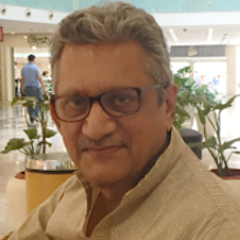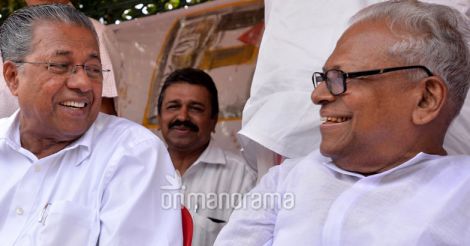In the course of my occasional visits to Kerala from Delhi, I had developed the impression that poverty had been virtually eliminated in Kerala. What created this impression was the absence of slums or thatched huts with mud walls even in the interior villages, especially in the Travancore-Cochin region. The ever-growing flow of migrant workers from other parts of India to Kerala in search of livelihood further reinforced this impression and convinced me that the reported statistics of unemployment among Keralites was nothing but political story-telling.
I was, therefore, in for a rude shock when I looked around after settling down in Kerala six years ago. As we started living in a modest apartment in Kottayam, our neighbour’s maid came with the request that we should take her sister as part-time cook because the sister’s family was finding it difficult to make both ends meet. The sister had two school-going children and her husband was a part-time construction worker who spent much of his small income on alcohol.
Sometime later a social worker took me to see the living conditions of a few families living on a bund near Kumarakom. Womenfolk in one of the families told us that their daughter had gone for an examination without any preparation because her father had spent the previous night on a drinking bout with his nephew that ended in a brawl. Nobody in the family had a wink of sleep at night and the girl had to go for her examination in the morning though she could not study in the midst of all the loud quarrel and violence. These are not isolated cases. In the last few years I have come across several cases of families finding it difficult to provide proper medical care to the sick or give quality education to their children.
Read: CBI is no touchstone for crime probes, Kerala cops should do better
The elite sections of Kerala society do not seem to be aware of or to care about the daily struggle of the poorest of the poor living in their midst. Kerala society gives a superficial impression of general prosperity. A fairly high percentage of Kerala households own at least a two-wheeler and many upper-middle-class families own more than one car. At least one person in a very large number of households is employed abroad. Most people live in brick-and-tile houses and send their children to regular schools. Hunger and poverty of the type that still persist in some other Indian states are no longer prevalent in Kerala.
This, however, does not mean that poverty has been eliminated in Kerala. There are still a large number of households who do not own homestead land or proper houses. There are many sick people who are unable to get proper medical treatment. When the sick go to government hospitals for treatment, they are asked to buy medicine from shops outside, which they find unaffordable. There is a long queue of sick people who are waiting for their turn for a kidney transplant in a government hospital because they cannot afford to go to the private hospitals.
The quality of education in most of the government schools and even the aided schools is so abysmally low that children find it difficult to compete in any competitive entrance examination for admission to professional colleges. Anyone who can afford it, sends his children to a CBSE school but a vast majority cannot afford it. On the other hand, aspiration levels have gone up. People have learned to dream but they often do not have the means to realize their dreams. Many of them, therefore, end up in inextricable debt traps.
The quality of education and delivery of healthcare will not improve and poverty alleviation measures will not be effectively implemented unless governance becomes corruption-free, government offices become people-friendly and government officials at all levels - irrespective of their political affiliations – are given deterrent punishment in every proven instance of harassment of the public. How can people be protected from criminals if policemen and officers found guilty of illegal action are retained in service with some minor penalty; or be provided proper healthcare if government doctors indulging in private practice are not punished; or be assured of quality education for their children if teachers who are not dedicated to the dharma of teaching continue in service and get promotions?
Unfortunately all the governments in Kerala, UDF or LDF, have been so beholden to organized sections of society that the unorganized people never got the priority they deserved. UDF has been beholden to various community organizations and LDF, to various unionized sections. No doubt LDF did a great deal in the early years for land redistribution, protection of labor rights and greater access to education. Once they collected the low-hanging fruits, however, the Left turned their focus on strengthening unions in every field. Whenever the interests of unions were at variance with those of the public at large, the former prevailed. When UDF was in power, the interests of their own anemic unions and the vested interests of various communities prevailed. Chief secretary Vijayanand recently remarked that the common man is afraid of going to a government office for anything. Neither LDF nor UDF has done anything in the last six decades to change this scenario.
The early statements of Kerala’s new chief minister, Pinarayi Vijayan, suggest that he is fully conscious of this unfortunate situation and wants to correct it. Will he be able to withstand the pressure of the party and the unions and act upon his promise of providing a corruption-free government that will focus on serving the people at large rather than the unions? Will he be able to take stringent action against members or leaders of the unions affiliated to the Left who harass the common man? We will have to wait and see.
The evolution of Kerala politics gives several important lessons and insights to those who care to analyze it. One of these is the fast disappearing role of community organizations in influencing the electoral behavior of their members. Even Muslim League, which is often considered the last bastion of these forces, is losing ground in its heartland. Political views of the church, NSS and SNDP do not matter any longer. Even the unions will not be able to get a government reelected if it is seen as kowtowing to the unions at the expense of the common man. The average voter has become more assertive and independent-minded than ever before.
Another significant lesson is the ultimate futility of quick-fixes to appease protesters and vested interests opposing government initiatives. It is a mistaken notion that appeasement brings votes. The job of the government is to govern. LDF will be reelected after five years if it can provide a government that will impartially focus on corruption-free governance, inclusive economic development and justice to all. The general impression is that Achuthanandan was just a loud-mouthed critic of everything and everybody while Pinarayi is a doer. Kerala has great expectations from the latter.
(The author is a former civil aviation secretary and former member, Union Public Service Commission. The views expressed are personal.)

























 The general impression is that Achuthanandan was just a loud-mouthed critic of everything and everybody while Pinarayi is a doer. File photo
The general impression is that Achuthanandan was just a loud-mouthed critic of everything and everybody while Pinarayi is a doer. File photo